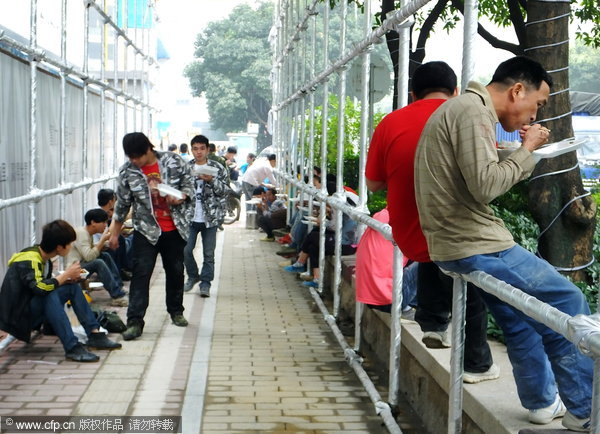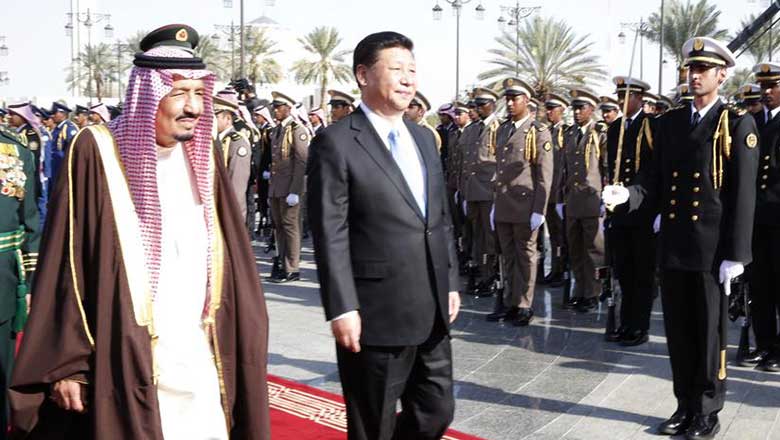Employers will have to pay
Updated: 2016-01-21 08:16
(China Daily)
|
||||||||
 |
|
Migrant workers are having lunch in Guangzhou, south China's Guangdong province on May 16, 2013. [Photo/CFP] |
Every year before Spring Festival there are a flood of reports of migrant workers not being paid by their employers. A range of measures recently worked out by China's Cabinet should help to at least curb the long-standing problem of employers defaulting on wages.
The measures, including real-name management of migrant workers, the overall responsibility of the chief contractor for migrant workers employed by subcontractors, the introduction of a cash deposit system and special accounts for their wages, as well as strengthened supervision, a blacklist system and strict punishments for defaulters, are expected to make it more difficult for employers to cheat migrant workers of their due pay.
The special accounts, for example, will prevent the employers from defaulting on workers' wages under the pretext of their failure to receive their own funds. While blacklisting enterprises that intentionally default on migrant workers' wages and their disclosure to the public, as well as denying them licenses, preferential loans and government procurement contracts are expected to deter enterprises from abusing the rights of migrant workers.
The strict implementation of these measures is both necessary and urgent, as the country's lingering economic woes have made life more difficult for many enterprises, small and medium-sized ones in particular, and increased the temptation for some not to pay their workers.
Although long overdue, the new measures are a concrete attempt to help migrant workers get the pay they are due and prevent unscrupulous employers from exploiting them.
The lack of a standardized labor system for migrant workers and the lack of punishments have proved to be prime reasons for wage defaults by employers. Thus, it is essential for the authorities to tackle this pressing problem by seeking to establish such a system and make employers pay a heavier price for not paying their workers.
- Railway police nab 40,315 fugitives in 2015
- China issues blue alert for snow storms
- Blast in firework factory leaves four missing, four injured
- Struggles of a Shanxi coal mine owner in bleak industry winter
- China launches system to check authenticity of living buddhas
- China sees rising online fraud in 2015: report
- Former US VP candidate Palin endorses Trump with a 'hallelujah'
- Gunmen kill at least 19 after storming Pakistan university
- Hollande makes last-chance push to curb French unemployment
- Taxi drivers block central Budapest all day in protest against Uber
- Police respond to reports of shooting at Sydney police station
- Okinawa squares up to Tokyo over US base row

 Xi boosts ties with Saudis
Xi boosts ties with Saudis
 Cold wave sweeps across China
Cold wave sweeps across China
 Internet tycoons' wacky costumes are annual galas' highlight
Internet tycoons' wacky costumes are annual galas' highlight
 Culture Insider: 6 things you may not know about Major Cold
Culture Insider: 6 things you may not know about Major Cold
 Chinese shoppers' 10 favorite destinations in 2015
Chinese shoppers' 10 favorite destinations in 2015
 Glass bridge across Zhangjiajie Grand Canyon under construction
Glass bridge across Zhangjiajie Grand Canyon under construction
 The life of a wood carving artist
The life of a wood carving artist
 Glenn Frey, founding member of the Eagles, dead at 67
Glenn Frey, founding member of the Eagles, dead at 67
Most Viewed
Editor's Picks

|

|

|

|

|

|
Today's Top News
National Art Museum showing 400 puppets in new exhibition
Finest Chinese porcelains expected to fetch over $28 million
Monkey portraits by Chinese ink painting masters
Beijing's movie fans in for new experience
Obama to deliver final State of the Union speech
Shooting rampage at US social services agency leaves 14 dead
Chinese bargain hunters are changing the retail game
Chinese president arrives in Turkey for G20 summit
US Weekly

|

|







